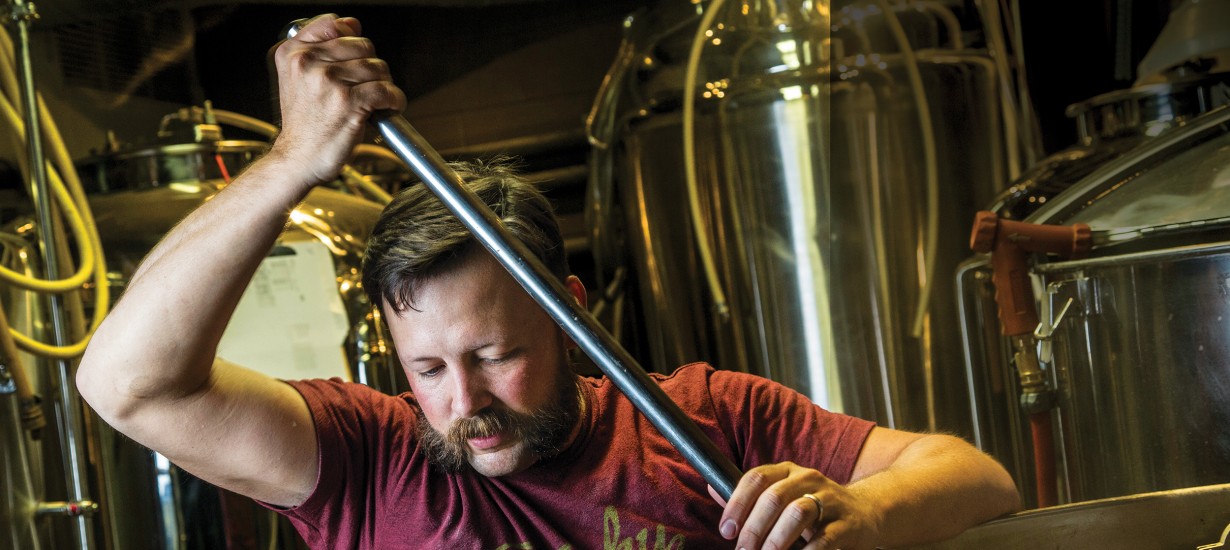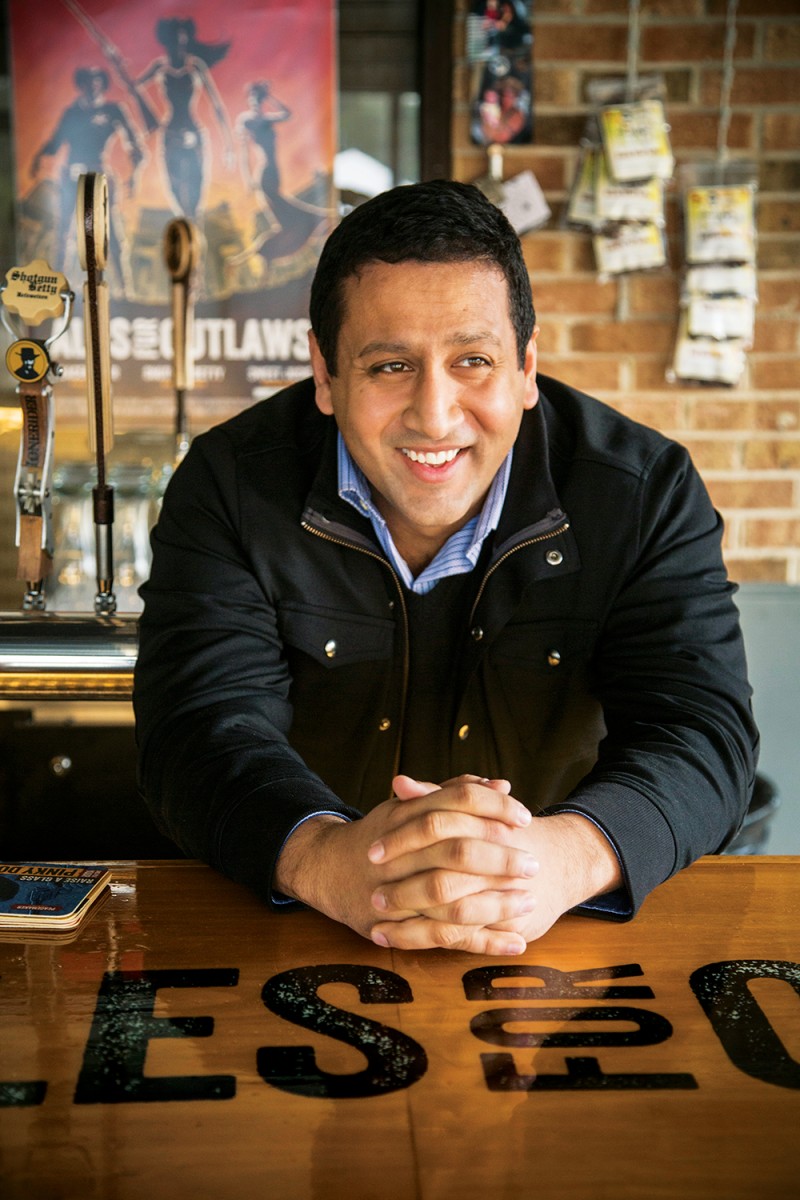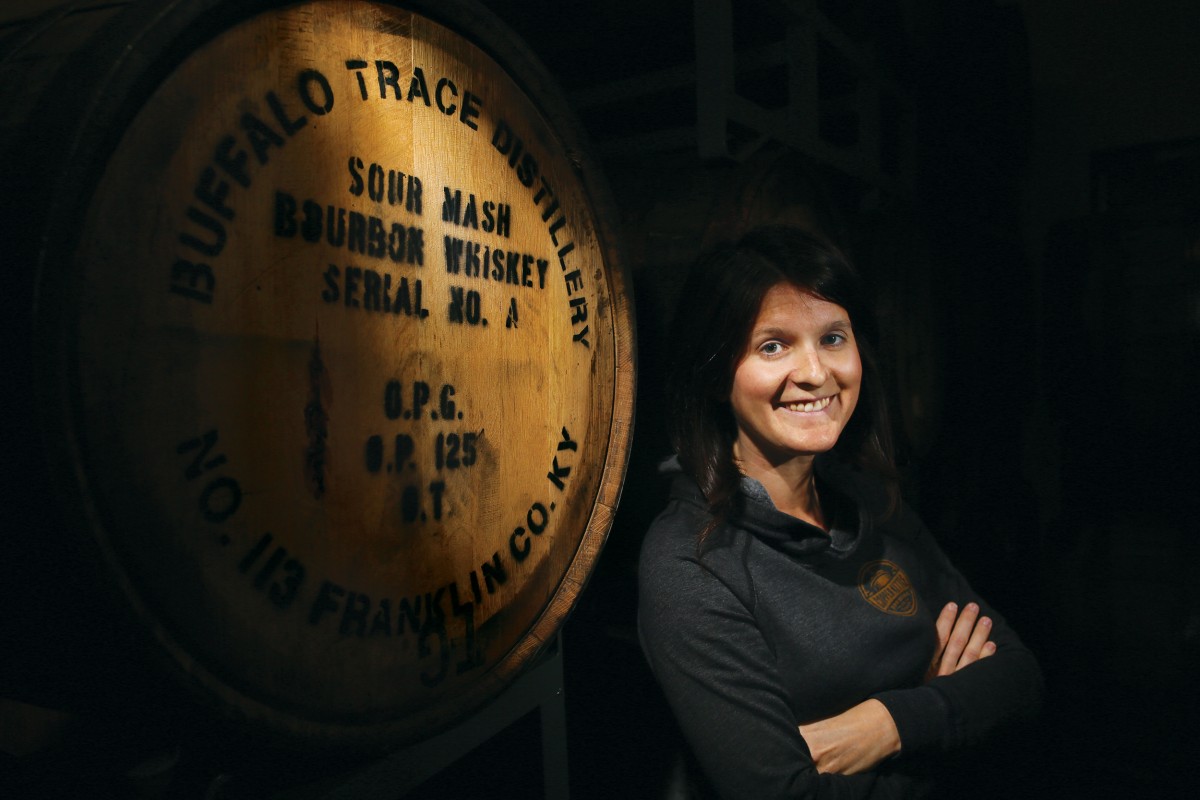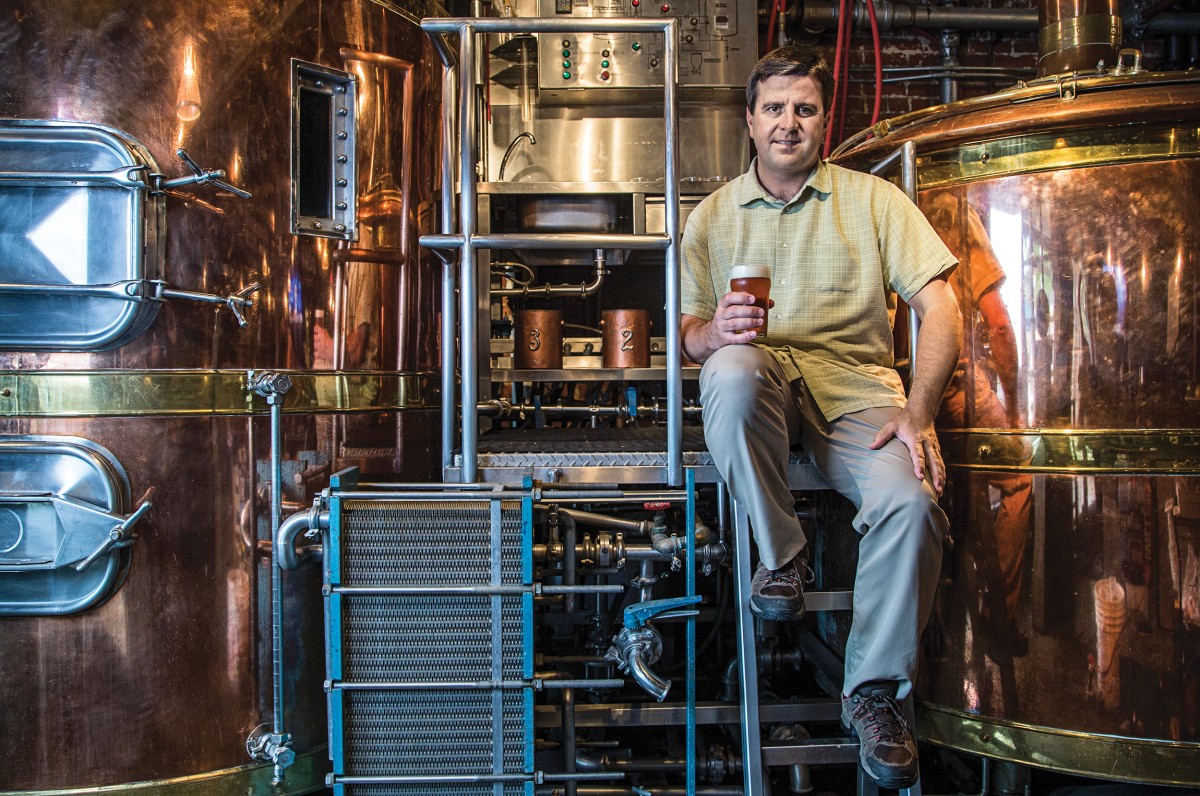From the Grain: It Couldn’t Hurt to Try

Les Stewart ’02 (MPA) hammered away at his homework from a barstool in Hell. It was in that subterranean (and now defunct) Rosemary Street dive that Stewart first encountered the boundary-breaking world of craft beer. It’s a world filled with imperial stouts and Belgian tripels, exotic scents and devoted fan bases, and it proved to be a powerful lure for a young man with entrepreneurial ambitions.
Ah, but first he had to try some more of those beers. So he expanded his scholarship to include independent studies at a number of other establishments, including Top of the Hill and Carolina Brewery, each of which crafted its own brews. “It was so cool to drink a beer that was born right there,” he said.
During grad school, he traded light chores for a small room in University United Methodist Church on Franklin Street.
“I used to always tell people that I was closer to the bars than they are to each other.” But what about that master’s degree?
“I was on a track …” Stewart said, as his thought trailed off with a smile.
The track that started with his MPA did not end in a government job. Instead, he started his own Web design company. He became a passionate home brewer. Later, after he and his homegrown creations earned a local following, he became friends with some Raleigh restaurateurs who hired him to be head brewer for their new project.
Trophy Brewing Co. opened its downtown Raleigh doors in spring 2013 and was an immediate hit. The brewery’s scratch-made pizzas include one made with caramelized onion thyme puree, herb-roasted carrots and cauliflower.
But the most adventurous recipes are saved for the beer. Among Stewart’s creations are The King, a Belgian dubbel-style beer that features the flavors of peanut butter and banana, and Swiner Bock, a smoked doppelbock designed to be consumed at a pig pickin’.
One-fourth of sales
If you still haven’t bought into the craft beer movement, consider this:
■ There are about 125 craft breweries in North Carolina. About 100 of those opened in the past decade.
■ Craft beer is responsible for $800 million in annual economic impact in North Carolina.
■ North Carolina has more breweries than any state in the South.

Sumit Vohra ’07 (MBA), “chief drinking officer” of Raleigh’s Lonerider Brewery. Here, nods to the shoot-’em-up outlaw flicks and spaghetti Westerns that inspired Vohra can be found in brews like the Belgian-style Beer With No Name and a stout called Pistols at Dawn. Photo by Travis Long
When a small brewery opened 20 years ago, food often was an integral part of the business, says Chris Rice ’94 (’02 MBA), publisher and CEO of the Durham-based All About Beer magazine. While new operations, including Trophy, sometimes feature a restaurant along with beer, brewers are realizing that food is not always necessary to draw the crowds needed to turn a profit.
Consumers are more educated than they once were when it comes to beer, so accomplished brewers can build businesses that stand on beer alone. In the ’90s, brewers worried themselves over whether people would ever come around to the taste of India Pale Ales, which have more of a bitter bite than the classic light beer. Today, IPAs are responsible for more than 25 percent of craft sales.
In an industrial area near RDU airport, Lonerider Brewing Co. has a taproom in a semipermanent, metal-and-plastic structure attached to the side of the brick brew house. There’s a dog-friendly patio and a big tent with picnic tables in the gravel parking lot. There’s no locally sourced anything on the menu, because there is no menu. There are Cheez Doodles in the vending machine; often there are food trucks.
A bustling crowd in the taproom sip Sweet Josie Brown Ales, Shotgun Betty Hefeweizens and Pacemaker Pale Ales. The brewery’s Western-style outlaw theme stems from “watching too many Clint Eastwood movies,” said founder Sumit Vohra ’07 (MBA).
Originally from India, Vohra came to the U.S. for college, earning an undergraduate degree in Alabama and a master’s degree in Georgia before setting off into the tech world. He studied for his UNC MBA at night, forming his Lonerider business plan under the tutelage of Ted Zoller ’10 (PhD), associate professor of strategy and entrepreneurship.
Before he launched the brewery in 2009, though, Vohra had to break the news to his teetotaler dad in India. After deftly explaining the business model, Vohra remembers what his father told him: “Hey dude, you’ve gotta do what you’ve gotta do.”
Really — he said it just like that?
“Well,” Vohra said, laughing. “I paraphrased him a little bit.”
Today, Vohra makes his dad proud as the self-titled “chief drinking officer” of a company that sells its beers in six states across the South, plus Washington, D.C.
He probably would make fast friends with Kristen Kozik ’04 (’07 BSN), who with her husband owns and operates Copper Kettle Brewing Co. in Denver. Like Lonerider, Copper Kettle eschews the restaurant model and welcomes food trucks.
Kozik and her husband, Jeremy Gobien, grew up in North Carolina and headed west after school for the sake of taking on a new challenge. An accomplished brewer, Gobien handles the beer while Kozik oversees the operations. The brewery opened in 2010 and has experienced 400 percent growth each year since.
It’s been difficult, says Kozik, who still works part time as a nurse, balancing work and home life within such a rapidly growing business. But microbreweries, she said, “are just going nuts.”
Cider, too
Some of these new businesses don’t even brew beer.

Kristen Kozik ’04 of Copper Kettle Brewing Co. in Denver, where some beers are aged in whiskey barrels, and where the taps might dispense an IPA with “notes of orange rind and pine,” or a blonde ale made with basil and cherries, or a stout brewed with Mexican chocolate, three kinds of chilis and cinnamon. Photo by Barry Guiterrez/AP
Bull City Ciderworks opened in Durham in 2014, a dream fulfilled by brewer Ryan Bogard ’05 and his four founding partners, three of whom are alumni: Ben Ingold ’09 (JD), Grant Griffith ’06 and Andrew Nelson ’05 (’10 MAC).
A beer home brewer, Bogard first tried craft cider when he was living in Massachusetts and working at Harvard Medical School.
“To me it was profound. It gave me the idea that ciders can be so much more polished,” Bogard said, in comparison to the alcoholic apple cider that was available in some groceries.
Soon he started brewing his own. Later, he enrolled in UNC’s doctoral program in biological and biomedical sciences, in part so he could come back to North Carolina and work on his idea for a cider business. He turned down a spot in the same program at Harvard.
Cider over an Ivy League doctorate? “It was an opportunity to do something I’m really passionate about,” he said. Bogard stuck with the doctoral program for only a year, but Bull City is expanding and plans to move into a larger facility later this year.
The King would love this
In 1995, the idea of starting a microbrewery on Franklin Street would’ve had many people saying you’ve lost your mind.
But Robert Poitras ’94 surged onward anyway, after being inspired by the beers he tasted in Europe while studying abroad. “In Germany, every town we went to not only had fresh beer, but they were so different than what we had in the U.S. And the people there were so proud of them.”
So Poitras and then-business partner Rice (now the beer magazine editor) raised the money and opened Carolina Brewery. The microbrewery has added a location in Pittsboro, where it built a facility that packages bottles and cans of Sky Blue Golden Ale and Flagship IPA that are shipped to more than 1,000 bars and restaurants across the Triangle.
Top of the Hill opened in 1996. Founder Scott Maitland ’95 (JD) has since expanded into the spirits business, crafting his own whiskey, vodka and gin.

Robert Poitras ’94 of Carolina Brewery. Said to be the oldest in the Triangle, the brewery has been a Franklin Street staple since 1995, and it supplies beer to more than 1,000 bars and restaurants. Here, Blue Blood Rivalry Pilsner celebrates the enmity between the Tar Heels and Blue Devils. Photo by Travis Long
Both establishments were pioneers in a state now known across the country for its devotion to finely crafted beer. “We helped show a generation of consumers that beer could be different,” Rice said.
It was that different sort of beer experience that influenced Geoff Lamb ’90 in 2006 to start Raleigh’s Big Boss Brewing Co., now one of the most popular in the Triangle.
Each year, Lamb serves his products at the GAA’s tailgate party prior to the Homecoming football game. The Chapel Hill native’s first thought at being asked if he would like to serve beer at the Bell Tower: “Are you kidding me?”
Which brings us back to Stewart, the Trophy brewer who got his first tastes of craft beer along Franklin Street. “Different” could be tattooed on this guy’s forehead.
A few years ago, Stewart and Trophy’s owners were kicking around ideas for an event that sought craft beer with extreme flavors. Someone wondered if it would be possible to whip up an ode to Elvis Presley’s favorite snack, the peanut butter and banana sandwich.
Well, it couldn’t hurt to try.
Stewart found a Bavarian yeast that reliably produces banana flavors if fermented in a certain way. He chose some bready-flavored grains, then added some peanut butter and unsalted peanuts. Thus was born The King, a Belgian dubbel.
It was a hit. And today, Trophy has a problem that any business would like to have. People love Stewart’s beer so much that he can’t keep up with the demand.
To that end, Trophy purchased property in Raleigh for a new production facility, where Stewart will be able to brew six times the amount of beer he does now, some packaged for retail sale.
It’s a lot of pressure, but Stewart thinks craft beer has plenty of room to grow.
“I couldn’t be happier,” said the guy who not that long ago trained for a career as a city administrator. “I can’t imagine myself in another job.”
Thanks for reading the Carolina Alumni Review
Carolina Alumni members, sign in to continue reading.
Not yet a member? Become one today.
